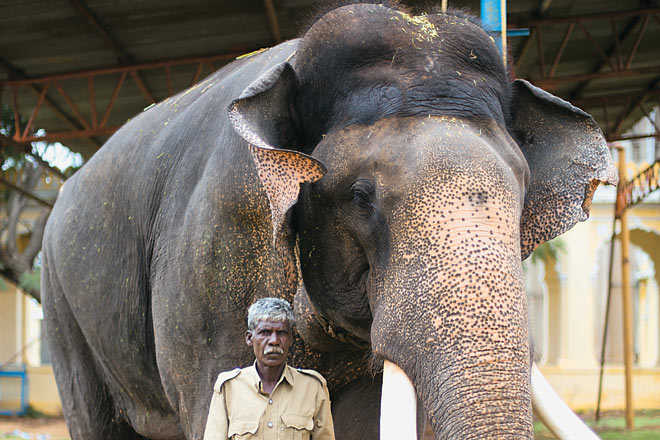OT: How did you become a mahout?
Doddamasti: I come from the village of Balle in Nagarhole where my grandfather, father, uncles and brothers worked with elephants. I have been helping around elephants since I was 10 years old — I used to wash, feed and ride. Today, my son Sanappa is my kavadiga (helper). He is training to become a mahout.
Elephants are intelligent beings. I have helped capture and train 200-300 elephants in my time. We catch them in a kedda (rectangular pit), where they learn to obey basic signals — for example, dachi means ‘go back’, dali is for raising the trunk and saluting, and sarak is a command to move this way or that. It’s tricky work and it is important to do it without hurting the elephant or rewarding him too quickly, for then he won’t obey.
OT: Tell us about Arjuna.
Doddamasti: Arjuna is 52 years old and I have been with him for the past 15 years. He is a calm fellow and is always peaceful with me. Even if I am standing in the middle of the forest or calling to him from a herd, he can recognize my voice and smell and will come to me. He is only difficult to manage when he is in musth, but that is natural. He feeds me the same way I feed him. Without him, I cannot survive either.
OT: How are elephants prepared for the Dasara festival in Mysore?
Doddamasti: Arjuna led the Mysore Dasara procession last year as well. The selection process is conducted by top forest officials — they observe how he walks, how many times he stops and his weight. Besides these, many other things have to be kept in mind when it comes to the procession elephants — gender, season, surroundings and their nature. This year four elephants are being trained to lead the procession so that in case one of them falls ill, another can substitute. Arjuna is one of them; the others are Gajendra, Balarama and Abhimanyu.
We take great care of the elephants. Their diet is very important. I feed Arjuna about 8-10 kilos of muddhe (cooked balls of paddy and wheat) with vegetables every morning and then we go for a walk for about an hour — it is important that he gets used to the noise, traffic and people. Every day, I increase the distance he travels. I also load him with weights approximately equivalent to the howdah he has to bear on Vijayadasami. I make a wooden cradle or platform and weigh it down with sand bags. After we come back from our walk, I feed him jaggery and salt mixed with cooked rice and vegetables — carrot, beetroot, cabbage and gourd. I repeat the same process in the evening. I massage castor oil on his forehead to soothe him.
The ambaari (the caparisoned bearer of the ceremonial howdah) elephant also gets a special feed of glucose, sugarcane and coconut but only as much as he wants to eat, no more. But I have to watch his weight carefully.
OT: Why is that?
Doddamasti: The wildlife veterinary doctor measures his weight regularly. The procession elephants should not be overweight or underweight. Arjuna now weighs 5,535 kilos, which is correct for him. Of course, he will put on some weight because of the special diet.
OT: Does Arjuna dislike any part of this?
Doddamasti: Well, he does not like the flash bulbs of cameras. He definitely does not like dogs at all, like any elephant. I also have to be very regular about his timings, otherwise he will get upset. Elephants are also very sensitive to smell, so the big crowds and city traffic make them feel vulnerable. But it’s okay. Even I don’t feel comfortable in my shiny red uniform with green sash — it gets a little sweaty. But it has been part of the tradition since the days of royalty.
I have travelled by Arjuna’s side and sometimes on top of the cabin of the special truck that brought us here — we have travelled 70km from Nagarhole. It’s only temporary and soon life will go back to normal.
Doddamasti, Mahout of Arjuna, lead procession elephant at the Mysore Dasara Festival 2013, Balle Elephant Camp, DB Kuppe, Nagarhole National Reserve, Karnataka – 571258
Leave a Reply
You must be logged in to post a comment.


